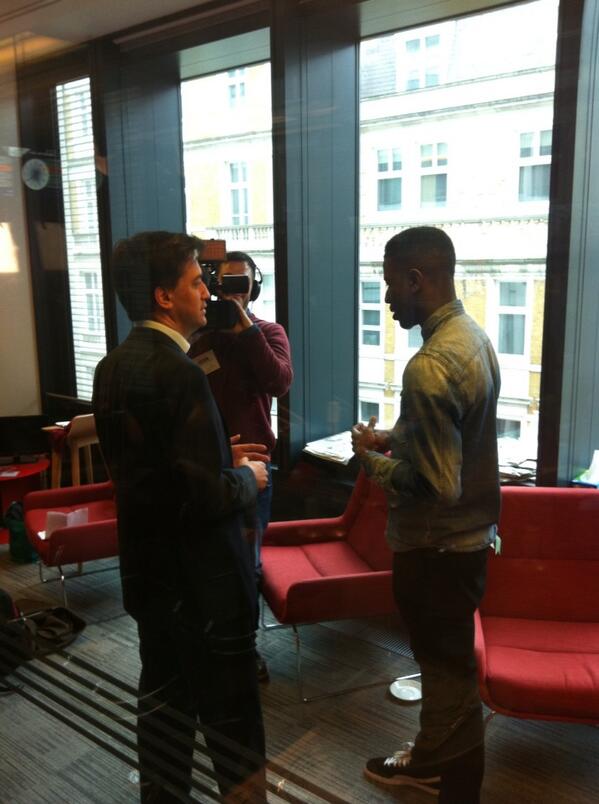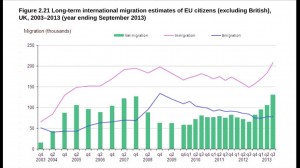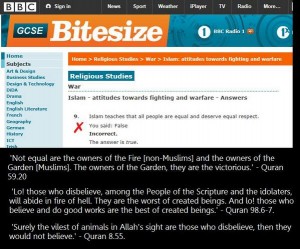Milipedia: n Condition of a BBC journalist being unaccountably attracted to the person and policies of Ed Miliband
John Pienaar….what to say? He just can’t seem to find a harsh word to say about young Eddy….or can he?

Today on ‘Pienaar’s Politics’ he had Ed Miliband on the rack for half an hour, he took no prisoners and cracked the whip…Miliband was given a proper roughing up over serious issues of State…the union take over of his party, Syria and the Russian invasion of the Ukraine and PIE.
Actually…no…I made that all up. This is Pienaar photographed preparing for the interview….

Miliband was given the softest of interviews, not even an interview really just a series of soft questions designed to allow Miliband as much time as possible to sell us his pitch.
Paxman’s interview with Russell Brand by comparison had something of the Spanish Inquisition about it….and we all know how laughable that was as a serious bit of journalism.

Nobody should expect any such ‘inquisition’ from Pienaar for his favourite adopted ‘nephew’.
Perhaps this gives us a clue as to why Pienaar is so mellow…….

The programme started promisingly with the Sun’s political editor, Tom Newton Dunn, nailing it on the head saying….
‘What can they say, Obama, Cameron and Miliband, to Putin who is totally satisfied that he has called the West’s bluff on Syria. The West blinked over chemical weapons, arguably a defeat inflicted upon the government by Ed Miliband and now Putin can do what he wants across the world without anyone caring.’

A pretty damning statement about Miliband’s influence….Putin does what he wishes because Miliband ducked not the actual use of force but merely the threat to use it in Syria…leading to Assad remaining comfortably in place with no intent, or need, to negotiate and Putin doing as he pleases knowing no one will lift a finger.
Pienaar has always claimed that Miliband is leading the way….over energy price freezes and Syria. But Miliband’s ‘influence’ has terrible consequences…in Syria….
and as for an energy price freeze…that has consequences too…..via Bishop Hill…..
Deepening Energy Crisis: Britain Has Become ‘Uninvestable’, Analyst Warns
The loss arises from pollution taxes that are forcing the closure of old coal-fired plants. Big subsidies for renewable energy, meanwhile, have made even gas-burning plants, which are much cleaner than coal stations, loss-making.
The hit will alarm Whitehall, which is increasingly worried about the lights going out. Companies have stopped building new power stations amid a political and regulatory backlash, sparked last year by Ed Miliband’s pledge to freeze energy prices.
“I can think of a dozen very good reasons not to invest in the UK, and not one good one to invest here this side of the election.”
OK I’ve had a few jokes at Pienaar’s expense but the issues are serious…..and yet Miliband was nowhere near breaking into a sweat at anytime…except when he was shown up by a much more articulate and personable Jermain Jackman.
Pienaar was supposedly getting to the bottom of the union’s influence…but instead declared that the newly approved rules would mean that no one could call Miliband a ‘creature of the unions’…and the Tories couldn’t call him Red Ed any more.
Miliband is allowed to get away with calling his new rules ‘an incredibly brave step’…and then he says that ‘I’m not factional’.
Pienaar says nothing…Miliband not factional? The leader of a Party that bases its politics on generating class warfare and ‘them and us’ name calling? The Leader of a Party that is controlled by Unite, whose leader wants to end democracy and impose Communism ala Ralph Miliband?
Pienaar does suggest Miliband owes his leadership to Union power but doesn’t follow up and challenge Miliband’s answer…a pattern followed throughout the interview with a soft question and Miliband allowed to answer without fear of contradiction.
Again another pertinent question…this time about Miliband’s ‘One Nation’…Pienaar taking his cue from Labour MP’s who have disagreed with Miliband’s approach…..Pienaar asks what does it mean, what are the policies?…it’s an old argument that people are turning away from.
But there is no rigorous questioning of Miliband’s reply.

We then had Jermain Jackman, singer on the BBC’s ‘The Voice’ and Labour activist pop in.
He gave a good account of himself, managing to sound more plausible than Miliband himself….but had to be silenced when he said we should be using songs, poetry, scripts and dance to push the politics….probably all too close to the truth for the BBC which inserts subliminal politics into all its programming and loves to bring on a celebrity to give anti-Tory rhetoric a bit of street cred…or so they think….ala Labour’s ‘Cool Britannia’ no doubt.
Pienaar tells Jermain he’s great and he’ll have his pick of Labour safe seats.
It all turned into a bit of a Labour love-in with no real answers wrung out of Miliband….there was no mention of the big scandal of the week that has dominated the headlines….Labour’s connection to the NCCL and PIE in the 70’s and 80’s…an extraordinary omission.
Tim Newton Dunn’s opening accusation was also completely ignored despite it being an extremely serious one that utterly undermines Miliband’s credibility as a serious politician who can be trusted to take difficult and complex decisions.
Note that Miliband spoke ‘outside the BBC’…….because he wasn’t asked about it inside the BBC.

Playing it safe whilst thousands die and millions suffer.
Miliband’s stance on the Union’s, Syria and his populist energy price freeze him to be someone without a stomach for the fight, someone without the necessary grit and judgement to be the leader of a nation, someone who will duck from those hard decisions but still try to take the credit for being ‘reasonable and moderate’ as people die or are forced to flee their homes and country in their millions because someone like Miliband didn’t dare take that decision that could change things….and the BBC is there to watch his back telling us what a fine job he is doing…..







